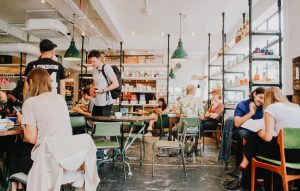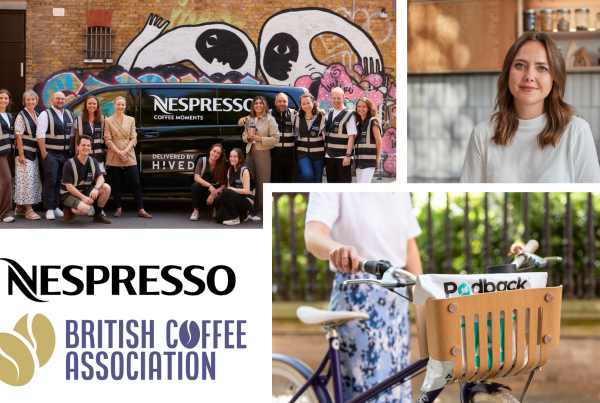 The UK economy has suffered greatly throughout the pandemic, with the retail and hospitality industries having been hit the hardest. According to the ONS, weekly household spending decreased by more than £100 on average as millions struggled through the three lockdowns. The coffee industry was also affected—yet in some cases, there have been glimmers of hope.Like many businesses, coffee companies have had to diversify their sales channels to generate new revenue streams and bring in new customers. A focus on online sales in the absence of coffee shop trips and the introduction of subscription models, are just two areas that have seen huge success over the past couple of years.
The UK economy has suffered greatly throughout the pandemic, with the retail and hospitality industries having been hit the hardest. According to the ONS, weekly household spending decreased by more than £100 on average as millions struggled through the three lockdowns. The coffee industry was also affected—yet in some cases, there have been glimmers of hope.Like many businesses, coffee companies have had to diversify their sales channels to generate new revenue streams and bring in new customers. A focus on online sales in the absence of coffee shop trips and the introduction of subscription models, are just two areas that have seen huge success over the past couple of years.
Decline in OOH Coffee Consumption
Out-of-home (OOH) coffee consumption, i.e. the coffee shop sector, makes up close to 25% of revenue for the coffee companies across the UK each year. It’s no surprise then that a closure of nearly 95% of businesses during the first lockdown in March of 2020 saw a large deficit fall upon the coffee industry in a short space of time. According to a report from the Kantar World Panel, OOH coffee sales in the UK dropped from £363 million in March of that year to £51 million in April, amounting to an overall fall of 86%.
Despite many coffee shops being able to stay open during the latter part of 2020, the true extent of the effect on the industry was still not known at this point. In February 2021, Jeffrey Young, the CEO of Allega Group (owner of World Coffee Portal), concluded that branded coffee shops had suffered a sales decline of 40% in 2020. Young further commented, “We anticipate further casualties over the next 12 to 18 months and further government assistance may well be required to ensure the short-term viability of many coffee shops and the wider hospitality industry. However, while steep reduction in daily commuting has decimated footfall at travel hubs and city centres, many neighbourhood outlets have benefitted from increased levels of home working as more customers have been choosing to shop locally.”
Online Sales See a Huge Boost
On the other hand, it appears to have been a different case entirely for coffee companies that have been able to streamline their business to maximise online sales. One in five Brits consumed more coffee during the pandemic, which runs in tandem with a number of coffee companies in the UK reporting high profit margins in the face of adversity, hence bringing encouragement across the industry.Back in November 2020, Baratza, a well-known manufacturer of coffee grinders, observed that the company’s sales have gone up by 70% since the pandemic started. Coffee Friend, an omnichannel UK coffee machine retailer, noticed a similar trend, reporting an increase of 175% in sales in the latter part of 2020 compared to the latter part of 2019. Aurimas Vainauskas, the CEO of Coffee Friend, explained, “In the second half of 2019, before the pandemic started, our online coffee sales in the UK experienced a growth of around 8.18% compared to the same period in 2018. In contrast, during the pandemic, there was an increase of around 76.27% in the first half of 2020 and 175.67% in the second half, compared to the same periods in 2019.”
Rise of Subscription Models
 With more and more businesses across the globe adopting subscription models to retain customers—be it streaming services or sports clubs—the coffee industry has now well and truly caught on. Many retailers are now offering subscription services in additionto their retail offering and there are a proliferation of new coffee subscription providers starting up. Covid-19 led to a rise in remote shopping as consumers limited time spent in shops prompting many people to look for new providers. In July 2020, Nespresso announced an expansion of its Swiss production facility, saying coronavirus continues to boost at-home coffee consumption globally. The subscription model has also allowed brands to frame coffee as a higher value, premium gift – and many saw an increase in sales over the Christmas period.
With more and more businesses across the globe adopting subscription models to retain customers—be it streaming services or sports clubs—the coffee industry has now well and truly caught on. Many retailers are now offering subscription services in additionto their retail offering and there are a proliferation of new coffee subscription providers starting up. Covid-19 led to a rise in remote shopping as consumers limited time spent in shops prompting many people to look for new providers. In July 2020, Nespresso announced an expansion of its Swiss production facility, saying coronavirus continues to boost at-home coffee consumption globally. The subscription model has also allowed brands to frame coffee as a higher value, premium gift – and many saw an increase in sales over the Christmas period.
Going forward
The pandemic has effected change in many areas of life, impelling us to adapt to new ways of working, for example – with many now operating a hybrid model of home and office work. The same can be said for the need for businesses to flex and adapt to the constraints imposed by Covid 19. We’ve seen many do that by diversifying into online and subscription models, and perhaps, as restrictions ease and service at coffee shops and hospitality venues return to normal, companies may want to keep their hybrid options in place too.

Provided by Vesta Ribakovaite at Coffee Friend
Additional comment by BCA



